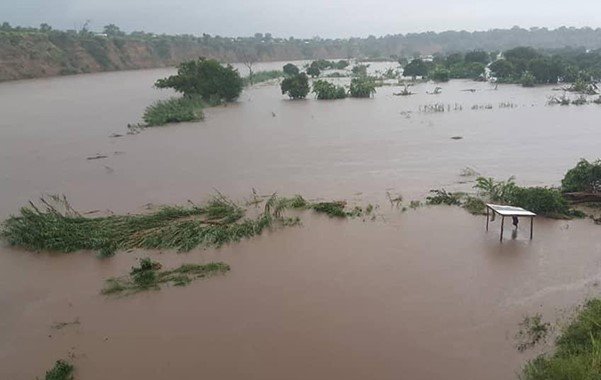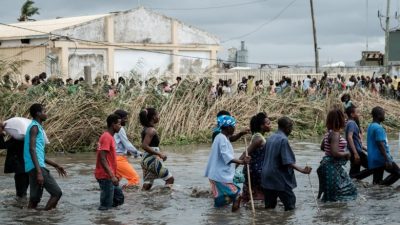During the early morning hours of March 14 storms and subsequent flooding destroyed homes, crops, businesses and public institutions bringing normal life to a halt while local and international rescue operations scrambled to provide temporary housing and medical assistance to the communities directly hit by the cyclone.
In the strategic port city of Biera in central Mozambique’s Sofala Province, it has been estimated that 90 percent of the infrastructure of the municipality was been destroyed. Although the port itself, a lifeline for the landlocked states of Zambia, Malawi and Zimbabwe, remains largely intact, with such destruction of surrounding areas, it is expected that the recovery process will take years.
Biera has experienced exponential growth over the last two decades. The population more than doubled since 1997 and the prospects for economic development were enhanced due to the discovery of vast amounts of natural gas resources off shore in the Indian Ocean.
The cyclone winds prompted continuous rains resulting in the overflowing of rivers causing flooding which wiped away everything in its path. Official accounts of the number of deaths stands at the time of this writing at approximately 750.
However, in Biera, hundreds of bodies were lying along the roads in a gruesome scene. The number of corpses poses challenges for identification, storage and burials. With the widespread flooding, returning the deceased to surviving relatives for burials will be almost impossible.
Due to the massive dislocation, injuries and deaths, it is not surprising that cases of the water borne disease cholera have surfaced. In Mozambique there were 139 confirmed cases as of March 29 with many more being anticipated. Nearly a million doses of the cholera vaccine are being rushed into the region through the auspices of the World Health Organization (WHO) to avoid deaths which could extend into the thousands.
Cholera is contracted through contaminated water sources and if not treated could kill its victims within a matter of hours. In light of the conditions prevailing in the makeshift internally displaced persons camps, the disease could rapidly spread causing further social problems for Mozambique and the other affected SADC countries.
Southern African news website reports that:
“The provision of clean drinking water is a priority in effected areas with reports emerging that citizens of Beira, a city of 500,000 people, have taken to drinking the stagnant water that has gathered on the side of the road as relief efforts struggle to restore life in the region to normal. Hunger and water shortages have further increased the risk of Cholera infection as desperate people take to eating and drinking contaminated food and water. The United Nations estimates that 1.8 million people in Mozambique, Malawi and Zimbabwe are in need of aid, primarily food, clean drinking water and medical supplies. Mozambique President Filipe Nyusi has declared that all health care in the regions affected will be free until such time as the crisis has been warded off.”
In neighboring Zimbabwe, the government of President Emmerson Mnangagwa has taken a leading role in mobilizing aid to the damaged regions of the country. Most of the damage has taken place in Manicaland and Masvingo provinces with the towns of Chimanimani, Chipenge and Bikita bearing the brunt of the storm.

Zimbabwe cyclone Idai flooding in Manicaland during March of 2019
There have been over 100 people killed in the disaster in Zimbabwe while some 200,000 have been in the direct line of cyclone Idai on the border with Mozambique. The government in Harare reported on March 28 that $100 million is being allocated for aid and reconstruction of the damaged areas.
Malawi reports that 90,000 people were displaced by the cyclone. One aid organization based Ireland, Concern, reported that anywhere between 80 to 100 percent of the maize crop has been destroyed by the winds and flooding. (See
this)
Economic Challenges within the SADC Region
All three states which were the epicenter of Idai are struggling against the broader political and economic forces imposed upon them by the Western industrialized countries. Mozambique, despite its natural resources and strategic location, was compelled in 2018 to renegotiate the terms of its financial obligations internationally. (See
this)
A former Portuguese colony for five centuries, the people could only obtain their national independence through an armed struggle which lasted for a decade. In 1975, the oppressed nation gained its freedom under the leadership of the Mozambique Liberation Front (FRELIMO), which remains in power today.
The country then served as a rear-base and frontline state supporting the liberation movements in contiguous Zimbabwe and South Africa. As a result, the FRELIMO government was targeted for regime-change where the settler-colony of Rhodesia and South Africa, both backed by imperialism, funded counter-revolutionary groups to undermine the independence and nation-building efforts beginning in the late 1970s.
Since the end of the imperialist-engineered civil war in the early 1990s, Mozambique has been emerging as a developing state. With the energy resource findings of recent years the hopes for an economic take off was promising. However, the decline in commodity prices since 2014, coupled with western-backed loans and other financial obligations, has slowed growth. Other challenges include the emergence last year of an “Islamist” armed group in the north which has engaged in infrastructural sabotage and murder against civilians. Consequently, the FRELIMO government must focus much-needed resources on defense and security concerns to repel the violent threats.
Zimbabwe, also won its independence by waging an armed revolutionary war from the mid-1960s until 1979, when a negotiated settlement with the European-settler regime, led to multi-party, non-racial elections in which the Zimbabwe African National Union, Patriotic Front (ZANU-PF) became the dominant party in 1980, extending its rule now for nearly 40 years. After a radical land redistribution program transferred land from the British commercial farmers to millions of Africans in 2000, Britain, the European Union (EU) and the United States have maintained sanctions against the ZANU-PF party and government creating tremendous economic problems.
Malawi, which gained its independence by way of political mobilization from Britain in 1964, is one of the world’s poorest states largely dependent upon agricultural production of tobacco, tea and sugar for export. More than half the population lives below the poverty line. As a result of its dependency on external trade, the country has run large deficits hampering its capacity for long term social and economic planning.
Climate Change and the Need for Economic Independence
The warming of the planet including ocean waters is often blamed for the worsening impact of cyclones and other weather-related issues. In Mozambique, Biera, the fourth largest city, had taken precautions to guard against floods stemming from heavy rains.
According to an article by Cara Anna published in the Associated Press dispatches for March 29, it says:
“Long and narrow with a 2,400-kilometer (1,500-mile) Indian Ocean coastline, Mozambique is on the frontline of fighting climate change in Africa, where most nations have little infrastructure and funding to cope. Rapidly growing coastal cities like Beira are especially at risk. The mayor (Daviz Simango) called it unjust that African nations face some of the toughest challenges while contributing little to global warming. People in rich, industrialized nations produce much of the carbon dioxide and other gases that are warming the planet by burning the most coal, diesel, gasoline and jet fuel.” (See
this)
Humanitarian agency Oxfam works in Malawi where Country Director, John Makina, noted:
“People have been left with nothing. They need help now and in the months and years ahead to rebuild their communities in a way, which equips them for a world where climate change means extreme weather events such as Idai happen more often. Idai is yet another deadly warning of the impact of unchecked climate change unless governments, particularly major emitters, fail to cut emissions fast.” (See
this)

Malawi children displaced by cyclone Idai during March 2019
Therefore, continuing economic dependency and rapid climate change must be addressed as foreign policy issues which threaten the future development of Southern African states. This imperative requires continental collaboration between all African Union (AU) member-states along with mass organizations, religious institutions, trade unions and youth. These issues are political in that they require immediate attention and correction to insure that Africa reaches its full potential which will result in genuine independence and sustainability.





